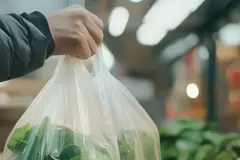Key takeaways
- Egypt extends its circular economy project targeting single-use plastics by one year to 2027, aiming to reduce plastic packaging waste.
- The project has established national standards for alternative plastic bags and introduced pilot recycling initiatives.
- The project, funded by Japan and supported by UNIDO, emphasizes building local plastic-alternative factories, strengthening regulations, and expanding industry participation.

Egypt has extended its project promoting circular economy practices in the single-use plastics value chain by one year, pushing its completion to 2027. The project aims to cut plastic waste across industries, particularly in the production of single-use packaging materials.
The extension aligns with national efforts to tackle plastic pollution and advance the transition toward sustainable production and consumption models.
Egypt’s local development minister and acting environment minister Manal Awad says that it should be the priority to establish factories producing plastic alternatives across various governorates to reduce transport costs and create conditions for plastic-free cities that could serve as national models.
The project has already achieved “notable milestones,” according to the Cairo Governorate. These achievements include five new Egyptian standards for alternative plastic bags, the launch of a nationwide awareness campaign titled “Reduce It,” and an assessment of local laboratories to strengthen their capacity to verify compliance with the new standards.
Combating plastic waste
The project is funded through a grant from the Government of Japan in cooperation with the UN Industrial Development Organization (UNIDO). The Federation of Egyptian Industries has called for expanding project funding to include more industrial facilities nationwide.
The project has partnered with Nile University to conduct a comprehensive market study on assessing raw material availability and industrial readiness. It has also implemented training programs to build the capacity of small and medium-sized enterprises and launched pilot recycling initiatives in collaboration with private sector companies.
Awad says the initiative is a model of effective development cooperation to curb plastic pollution, which poses “a growing threat to biodiversity and livelihoods.”
She also emphasizes the need to prepare a timeline and financial framework for the upcoming phases, highlighting the importance of industrial engagement, stakeholder awareness, and the development of policies and legislation to facilitate a phased transition toward plastic alternatives.
Last year, SIG, Plastic Bank, and the German development agency launched a project leveraging blockchain technology to address Egypt’s packaging pollution. The project is said to be laying the groundwork for an EPR model in Egypt and supporting the livelihoods of local waste collectors.











